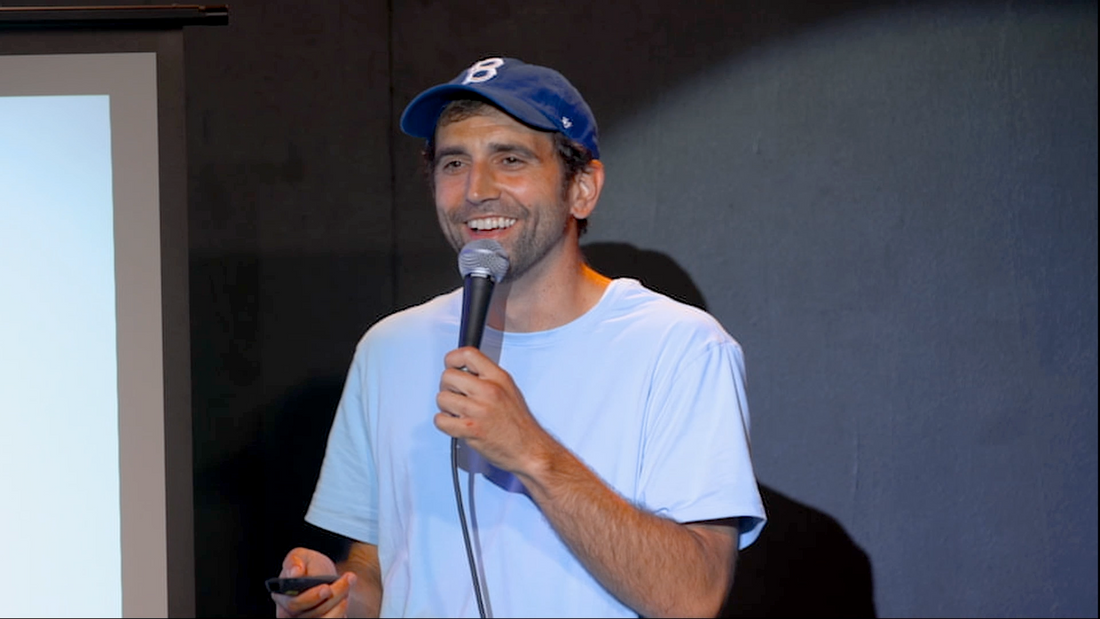In 2009, David Thorne released his book The Internet Is A Playground, which focuses on his attempts to hoax, fool, and otherwise troll specific groups and people he deems worthy of annoyance. The pleasure of it was in the context and being able to see immediately how Thorne was walking the line between annoyance and hostility in terms of the emotional response of his target. Moves to escalate but not cause retaliation were thoughtful and deliberate, but read as effortless. From there, trolling took off in BuzzFeed viral post roundups, memes, and the “Rick rolling” phenomenon, but have never really gotten back to the heights of Thorne’s book. Ben Palmer has cracked some sort of code with his special, You Can Be Anything, and reminds everyone what a powerful tool trolling can be when used for good.

Ben Palmer’s use of powerpoint is a stroke of brilliance. His commitment to good is a stroke of necessity.
In the hands of a different comic, the comedy could have ended up as strict stand-up that could have been confusing, or reached for an emotional poignancy that wasn’t necessary. Palmer smartly circumvents this issue by having the entire set consist of a powerpoint show that displays the work he’s done, with him primarily providing context on stage. By having the visuals do the heavy lifting, Palmer is able to portray why trolling has remained a part of internet culture. With each click of his remote, Palmer reminds the audience what can be achieved with wit in a world of abrasive anger.
This is compounded by Palmer's commitment to doing good with his trolling talents. Every target is (mostly) someone who is angry at a changing world, a pyramid scheme, or a troll billionaire with a penchant for space travel. In one example, Palmer joins an anti-vax group as “Rob Burlap,” and once accepted, changes his handle to “Measles” with an image of the virus. In another, a man named Trey comments on a Macy’s Day Thanksgiving Parade scene where two women kiss, saying “being g… is unnatural.” Palmer as Macy’s responds “It’s okay to be gay. It’s okay to be Trey. Love yourself, and it’ll be okay.” At other points, he pretends to be Joel Olsteen, a mega-pastor who Palmer claims is disconnected from people and is essentially not helping them, and responds to someone asking for prayers with two moneyed tiers of either 3 prayers a month or 10 prayers a month, depending on how much the individual wants to pony up. The post picks up enough attention to be on the news, and is debunked by Snopes. Palmer then creates his own Snopes page that lists the message as true. Over and over, Palmer tries to carve out space for fighting back in such a way as to deflect rather than injure.
Palmer’s pacing in the special shows a deft understanding of the conventions of stand-up comedy.
Having done standup for over a decade, Palmer showcases his expert sense of timing and heightening with his layout in the special. Everything from the running theme of “You can be anything on Facebook/You can be a…” to the arrangement of his interactions moves his point forward in an engaging way for the audience. In the former, we move from seeing him pretend to be a company, to a pastor, city, plaintiff, defendant, journalist, and attorney, to name a few. Here, the bell curve of a large entity to something smaller before repeating is something we see over and over in a traditional stand-up set. The need to hook the audience, cool off, light them up again, and stick the landing is the bedrock of a traditional set, and Palmer applies this at the micro level as well.
In one memorable run, he trolls Monat, a multi-level marketing scam that leads buyers to lose their hair, by pretending to be a journalist. He starts small, but quickly escalates by sharing a meme of Vin Diesel saying that Monat has helped him stay bald for years. He is given a cease and desist letter, and responds with his own, ultimately culminating in his joining a zoom party hosted and attended by the scam leaders themselves. Initially kicked off, he joins under a different name, and dunks on them one final time before being kicked off for good. Here, every beat of the interaction mimics the rise and fall of a great joke, with smaller steps serving as tags, and larger moves working as punchlines.
Ultimately, Palmer makes a case for trolling as an extension of the stand-up art form, but primarily as an art unto itself.
Outside of Hasan Minhaj and Aparna Nancherla specials, or smatterings of still images or the like in sets from Hannibal Buress or other well-established comics, we haven’t had the privilege of being treated to much screen-oriented comedy. In his act, Palmer does a tremendous job of making a case for more of it in comedy. Perhaps more importantly, by showing that it can be engaging for over half an hour, he makes a compelling case for trolling as something born of wit, but with the right approach, can generate a form of comedy unlike any other.
Ben Palmer's special You Can Be Anything will be available to watch for free on YouTube tonight at 7 PM CT!





